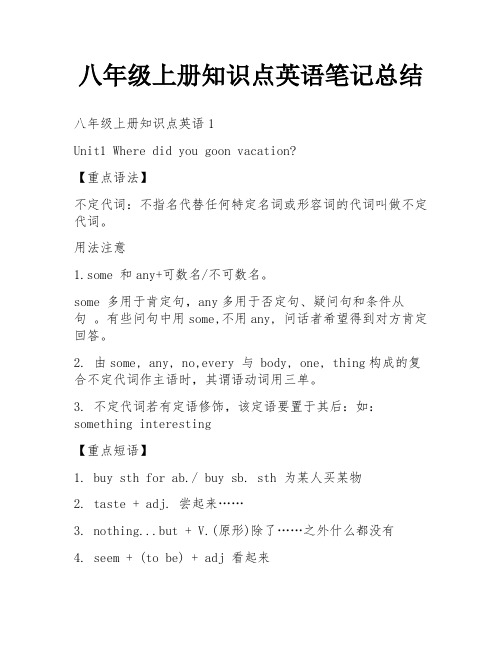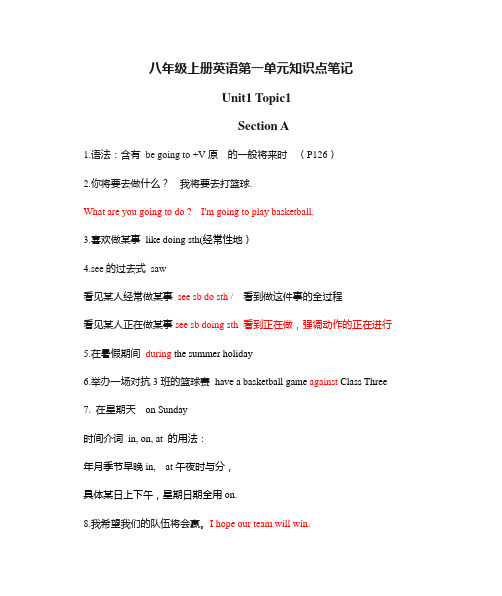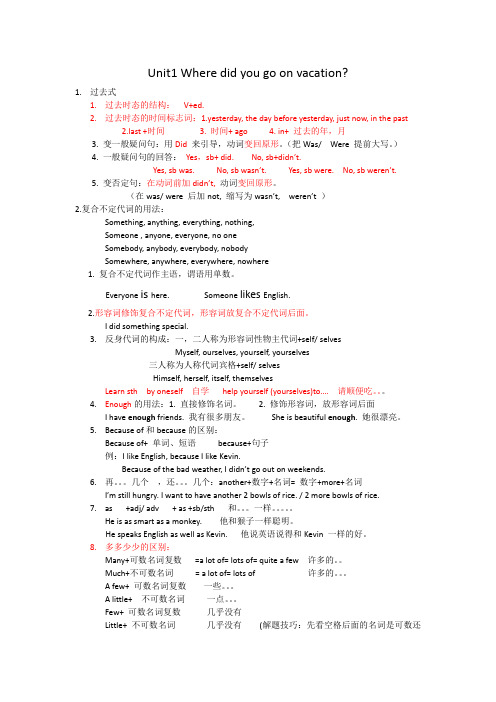八年级上册unit 1 复习笔记
英语人教版八年级上unit1知识点笔记

Un i t 1 Wh e re d id yo u g o on v acation?1•一般过去时考点1:如何判断一般过去时?考点2:肯定句变否定句。
考点3:变一般疑问和特殊疑问句。
2•复合不定代词/副词构成: _________ _________ ___________ _________其中:(no one意思“______ ”指 __ ,与_________ 同义,且与of连用,做主语谓语用单三。
回答引起的特殊疑问句时要用no one.none意思“ ___ ”,指____________ ,且 __ 与of连用。
谓语单,复形式皆可。
回答 _________ 引起的特殊疑问句时要用none;-anyone意思" _____ ”扌旨___ ,与 __ 同义,且_____ 与of连用。
_any one 意思" ____ ”扌旨___ ,与 __ 同义,且_____ 与of 连用。
nothing= _________________用法:① 复合不定代词做主语,谓语动词用 ________ •②当adj.修饰不定代词要_________ •③ 当不定代词中含有some通常用于__________ ;含有any通常用于_______________我自己myself你自己他自己她自己它自己我们自己你们自己他们自己反身代词在句中可用作动词宾语、介词宾语、表语和同位语等,如:She can dress herself.作动词宾语)That?poor?boy?was?myself.(用作表语)Thefatherhimselfhassomething wrong.(同位语:句中常置于名词、代词之后或句子末尾We clean the room ourselves.(同位语:句中常置于名词、代词之后或句子末尾常用短语:穿衣服;?玩得快乐;随便吃;随便用;2.few 意为___________,修饰__________ 名词,倾向于否定。
八年级上册英语Unit 1笔记

八年级上册英语Unit 1笔记1.为考试而学习 study for a test=study for an exam 2去中心公园go to central park 3.好久不见 long time no see4.在度假 be on vacation=go on vacation5.和家人去某地 goto某地with my family 6.黄果树瀑布 Huangguoshu waterfall7相当多,不少 quite a few+复数,quite a little +不可数名词。
quite a lot(of+可或不可) 8.大部分时间 most of the time 注意:very+few/ very little 9.呆在家里 stay at home 10.当然 of course11.似乎没人厌倦 No one seemed to be bored. (注意:no one不能跟of…)12.Seem的用法主语+seem/seems/seemed +to do.或主语+seem/seems/seemed+形容词 13.写日记 keep a diary14. no one与none区别 1。
No one指没有人,做主语是单数,不能加of…,而none指没有人或没有物,做主语单复数都行,可以加of…, 如: None of us was/were late. 15. 为某人买某物 buy sth for sb=buy sb sth 16. 你呢 what about you?17. 打篮球去怎么样What about playing…注意:about后面的动词+ing18. 一切东西品尝起来很好 Everything tastes good. / Everything tasted good.注意:五个感官动词feel/sound/look/smell/taste是系动词+形容词,如:Itlooked wonderdul 20. 除了…外什么也没有…nothing but…, 如:There isnothing in the cup but water. 21.到达某地 arrive in/at某地=get to某地=reach某地 (home/here/there前不加介词 22.决定(不)做某事 decide (not )to do, 如:We decided to take a train. 23.尝试做某事 try doing, 如: Itried making dumplings yesterday.24.尽力做某事try to do=try one’s best to do, 如: I will try tostudy English well. 25.感觉像… feel like+that从句,如:I feel like hewill die(死)Feel like还有另一个意思,即想要做某事: feel like doing=would like to do 27.骑自行车到某地 ride bicycles to某地28.古老的建筑物 old buildings (注意: build建造,过去式是built)29.100年前 100 years ago30.我想知道过去的生活是什么样子 I wonder what life was like in thepast?(注意: wonder 后面的句子是宾语从句,要用陈述句的顺序,如 She wonderedhow old you are.) 31.喜欢做某事 enjoy doing=like doing 32.玩的愉快enjoy oneself=have a good time 33.在镇上到处走走 walk around the town34.一天的差异是多么大啊 What a difference (a day makes!)感叹句的主语谓语可以省略 35.两种感叹句结构 What +(a/an)+形容词+名词(单复数或不可数)+(主语+谓语) How + 形容词 +(主语+谓语) 36.走到山顶 walk to the top, 从山顶: from the top of the hill在山顶:at the top of the top 37.开始做某事 start doing=start to do, 如Itstarted raining hard /heavily)=i t started to … 39.等火车 wait for the train. 在火车站等 wait at the train station 42.两个“因为”区别. Because +句子,而because of +名词短语或代词。
八年级上册英语第一单元单词笔记

八年级上册英语第一单元单词笔记一、anyone ['eniwʌn] pron. 任何人。
1. 用法:用于疑问句和否定句中,代替someone。
例如:Did you see anyonein the room?(你在房间里看到任何人了吗?)2. 拓展:在肯定句中通常用someone,但anyone也可用于肯定句中表示“任何人”的意思,强调个体。
二、anywhere ['eniweə(r)] adv. 在任何地方;无论何处。
1. 用法:常与否定词或疑问词连用。
例如:I can't find my book anywhere.(我到处都找不到我的书。
)2. 辨析:与somewhere的区别。
somewhere用于肯定句,表示“某个地方”;anywhere用于否定句和疑问句。
三、wonderful ['wʌndəfl] adj. 精彩的;绝妙的。
1. 用法:用来形容事物非常好、令人赞叹。
例如:We had a wonderful time at the party.(我们在聚会上玩得很开心。
)2. 拓展:同义词有excellent, great等。
四、few [fjuː] adj. & pron. 不多;很少。
1. 用法:- 作形容词时,修饰可数名词复数,表示数量少。
例如:There are few students in the classroom.(教室里几乎没有学生。
)- 作代词时,可单独使用,指代可数名词复数。
例如:Many people came to the party, but few stayed long.(很多人来参加聚会,但很少有人待很久。
)2. 辨析:a few表示“一些,几个”,有肯定含义;few表示“很少,几乎没有”,有否定含义。
五、quite a few相当多;不少。
1. 用法:修饰可数名词复数。
例如:I have quite a few friends here.(我在这里有相当多的朋友。
八年级上册英语一到三单元笔记

八年级上册英语一到三单元笔记Unit 1 Where did you go on vacation?一、重点单词。
1. anyone.- 词性:代词,意为“任何人”,常用于疑问句和否定句中。
例如:Did you meet anyone interesting on your vacation?(你在假期遇到有趣的人了吗?)2. anywhere?- 词性:副词,意为“在任何地方;无论何处”。
例如:I can't find my keys anywhere.(我到处都找不到我的钥匙。
)3. wonderful.- 词性:形容词,意为“精彩的;绝妙的”。
例如:We had a wonderful time at the beach.(我们在海滩度过了一段美妙的时光。
)4. few.- 词性:形容词,意为“很少的;不多的”,修饰可数名词复数,表示否定意义。
例如:There are few apples on the tree.(树上几乎没有苹果了。
)- 区别于“a few”,“a few”表示“一些;几个”,有肯定意义。
例如:There are a few students in the classroom.(教室里有几个学生。
)5. most.- 词性:形容词,意为“大多数的;大部分的”。
例如:Most students like English.(大多数学生喜欢英语。
)- 也可作名词,意为“大多数;大部分”。
例如:Most of the time, I stay at home.(大部分时间,我待在家里。
)6. something.- 词性:代词,意为“某事;某物”,常用于肯定句中。
例如:I have something to tell you.(我有某事要告诉你。
)- 区别于“anything”(用于疑问句和否定句)和“nothing”(意为“没有什么;没有东西”)。
例如:Do you have anything to drink?(你有什么喝的东西吗?)There is nothing in the box.(盒子里什么都没有。
八年级上册知识点英语笔记总结

八年级上册知识点英语笔记总结八年级上册知识点英语1Unit1 Where did you goon vacation?【重点语法】不定代词:不指名代替任何特定名词或形容词的代词叫做不定代词。
用法注意1.some 和any+可数名/不可数名。
some 多用于肯定句,any多用于否定句、疑问句和条件从句。
有些问句中用some,不用any, 问话者希望得到对方肯定回答。
2. 由some, any, no,every 与 body, one, thing构成的复合不定代词作主语时,其谓语动词用三单。
3. 不定代词若有定语修饰,该定语要置于其后:如:something interesting【重点短语】1. buy sth for ab./ buy sb. sth 为某人买某物2. taste + adj. 尝起来……3. nothing...but + V.(原形)除了……之外什么都没有4. seem + (to be) + adj 看起来5. arrive in + 大地方 / arrive at + 小地方到达某地6. decide to do sth. 决定做某事7. try doing sth. 尝试做某事 / try to do sth. 尽力做某事8. enjoy doing sth. 喜欢做某事9. want to do sth. 想去做某事10. start doing sth. 开始做某事=begin doing sth.11. stop doing sth. 停止做某事区分:stop to do sth. 停下来去做某事12. dislike doing sth. 不喜欢做某事14. so + adj + that + 从句如此……以至于……16. tell sb. (not) to do sth. 告诉某人(不要) 做某事17. keep doing sth. 继续做某事18. forget to do sth. 忘记去做某事 / forget doing sth 忘记做过某事【词语辨析】1. take a photo/ take photos 拍照quite a few+名词复数“许多…”2. seem + 形容词看起来…... You seem happy today.seem + to do sth. 似乎/好像做某事 I seem to have a coldIt seems + 从句似乎..…. It seems that no one believe you.seem like ... 好像,似乎….. It seems like a good idea.3. arrive in +大地点= get to= reach+地点名“到达......”arrive at +小地点(注:若后跟地点副词here/there/home, 介词需省略,如:arrive here; get home)4. feel like sth 感觉像…feel doing sth. 想要做某事5. wonder(想知道)+疑问词(who, what, why)引导的从句。
人教版八年级英语上册单元笔记_I_(Unit1-Unit6)

人教版八年级英语上册知识点总结Unit 1: How often do you exercise?【语言目标】会使用频率副词及短语;能描述课余时间的活动安排;会描述基本饮食结构。
1.how often”是一个特殊疑问词。
所谓的“频率”指的是某个动作多长时间/多久发生一次。
试比较:How often do you swim ?你多久游一次泳?How often does your father go to a movie?你爸爸多久看一次电影?针对“how often”引导的问句所进行的回答:twice a week, three times a month如always ,usually, often, sometimes, hardly ever, never.例:对划线部分提问:He always takes a bus to school. 注:划线部分都是对“频率”的描述,所以答案为How often does he take a bus to school?He never takes a bus to school.2.I always go shopping . Go +V-ing 表示“去xx”。
常见形式还有:go swimming,I often go skateboarding. go fishing,go walking...3.I can't stand shopping. 我无法忍受购物。
“意为:无法忍受xxx 。
特别注意:stand 后跟V-ing 形式。
对比复习介意xxx".例:Can you stand _______(hang) out with that silly boy?My father doesn't mind _______ (shop) this afternoon.4.]]],常用于句首,其后跟名词、代词或例:As for him,I never want to see him here. 至于他,我永远不希望在这里见到。
八年级上册英语第一单元知识点笔记

八年级上册英语第一单元知识点笔记Unit1 Topic1Section A1.语法:含有be going to +V原的一般将来时(P126)2.你将要去做什么?我将要去打篮球.What are you going to do ? I'm going to play basketball.3.喜欢做某事like doing sth(经常性地)4.see的过去式saw看见某人经常做某事see sb do sth /看到做这件事的全过程看见某人正在做某事see sb doing sth 看到正在做,强调动作的正在进行5.在暑假期间during the summer holiday6.举办一场对抗3班的篮球赛have a basketball game against Class Three7. 在星期天on Sunday时间介词in, on, at 的用法:年月季节早晚in, at午夜时与分,具体某日上下午,星期日期全用on.8.我希望我们的队伍将会赢。
I hope our team will win.我也是. Me, too.9.你愿意来为我们加油吗?Would you like to come and cheer us on?当然,我愿意Sure,I'd love to.cheer sb on ( sb用的是人称的宾格, 因为跟在动词后)10. 你更喜欢哪一种运动,A or B ?Which sport do you prefer,A or B?11. prefer的用法(1) prefer + 名词= like +名词+ better如:I prefer apples = I like apples better(2) prefer A to B (和B比起来更喜欢A )(3) prefer doing sth更喜欢做某事(4) prefer doing sth to doing sth和做某事比起来,更喜欢做某事(更喜欢前面的,即prefer 后紧跟的动作)(5) prefer to do sth rather than do sth和做某事比起来,更喜欢做某事(更喜欢前面的,即prefer 后紧跟的动作)12. 你划船多吗? 是的,非常多/ 不,很少。
人教英语八年级上册 1单元知识点笔记

Unit1 Where did you go on vacation?1.过去式1.过去时态的结构:V+ed.2.过去时态的时间标志词:1.yesterday, the day before yesterday, just now, in the pastst +时间3. 时间+ ago4. in+ 过去的年,月3. 变一般疑问句:用Did来引导,动词变回原形。
(把Was/ Were 提前大写。
)4. 一般疑问句的回答:Yes,sb+ did. No, sb+didn’t.Yes, sb was. No, sb wasn’t. Yes, sb were. No, sb weren’t.5. 变否定句:在动词前加didn’t,动词变回原形。
(在was/ were 后加not, 缩写为wasn’t, weren’t )2.复合不定代词的用法:Something, anything, everything, nothing,Someone , anyone, everyone, no oneSomebody, anybody, everybody, nobodySomewhere, anywhere, everywhere, nowhere1. 复合不定代词作主语,谓语用单数。
Everyone is here. Someone likes English.2.形容词修饰复合不定代词,形容词放复合不定代词后面。
I did something special.3.反身代词的构成:一,二人称为形容词性物主代词+self/ selvesMyself, ourselves, yourself, yourselves三人称为人称代词宾格+self/ selvesHimself, herself, itself, themselvesLearn sth by oneself 自学help yourself (yourselves)to…. 请顺便吃。
- 1、下载文档前请自行甄别文档内容的完整性,平台不提供额外的编辑、内容补充、找答案等附加服务。
- 2、"仅部分预览"的文档,不可在线预览部分如存在完整性等问题,可反馈申请退款(可完整预览的文档不适用该条件!)。
- 3、如文档侵犯您的权益,请联系客服反馈,我们会尽快为您处理(人工客服工作时间:9:00-18:30)。
Unit 1: How often do you exercise?
一、交际用语及重点句型
1、--What do you (they) usually do on weekends ? --I (They) usually play soccer .
2、--What does he (she) usually do on weekends ? --He (She) often goes to the movies .
3、--How often do you (they) exercise ? --Once a day .
4、--How often does he (she) watch TV ? --Every day .
5、--What’s your favorite program ? --It’s Animal World .
6、--How many hours do you sleep every night ? --Eight hours .
7、I exercise every day . 8、My eating habits are pretty good .
9、I eat fruit and drink milk every day . 10、I never drink coffee .
11、Of course , I love junk food , too . 12、I sleep nine hours every night .
13、I look after my health . 14、Healthy lifestyle helps me get good grades.
15、Good food and exercise help me to study better . 16、I hardly ever exercise .
二、重点短语
How often、high school 、as for、junk food 、How many 、of course 、a lot of、surf the internet (上网)、healthy lifestyle 、go skate boarding (踩滑板) 、eating habits 、do homework、get good grades、take a vacation、get back
三、知识点
1. how often 多久一次,用来提问频率,它的答语通常有以下几种形式:(1)Every day ;(2)类似once a day, twice a week, three times a day 等短语;(3)表示频率的副词:always , usually, often , sometimes, hardly ever ,never等。
2. How many times :多少次How many hours:多少小时
3.次数词口诀:一次once两次twice特殊记;三次以上基数词加上times;
4.all: 100%; most:51----99%; some: 1—50%; no: 0% ;
5. advice (名词) 建议,是一个不可数名词,“一条建议”译为“a piece of advice”suggestion(名词) 建议,是一个可数名词;
6.lie(动词) 平卧、躺;lie down躺下;lie in bed躺在床上;
lie(名词)谎言;tell a lie说谎;
7.look after 的同义词是take care of和babysit
8. “保持健康”的三种表达:keep healthy=stay healthy=keep fit ;
9. take exercise的同义词是do sports:做运动
10. the same as 与……相同; the same to you 愿你也如此(可表示祝福)
11. different(形) 不同的,be different from 与……不同
difference(名) 区别、差异,是一个可数名词,make a difference to 对……有影响;
12. although = though虽然
13. most of the students = most students 大多数学生
14. shop=go shopping=do some shopping (去)购物
15. be good for 对……有益, 它之后常接名词或动词—ing;
be good at + 名词或动词—ing = do well in +名词或动词—ing ;
16. keep in good health = be in good health保持健康
17. 含有food的词组:
junk food垃圾食物; healthy food健康食品; natural food天然食品; green food 绿色食品;
18. health (名词) 健康
healthy (形容词) 健康的 unhealthy(形容词) 不健康的;
19.含有as的相关词组
as for至于;as well也、又;as well as 与……一样好;as if = as though好像;
20. try to do sth. 尽力做某事
21. of course = certainly = sure当然
22. hardly=almost not几乎不
23. both二者都,neither二者都不(对二者的全否定);
all所有的、全部的,none of 没有一个(对三者或三者以上的全否定);
either 二者之一
四、书面表达
My eating habits。
